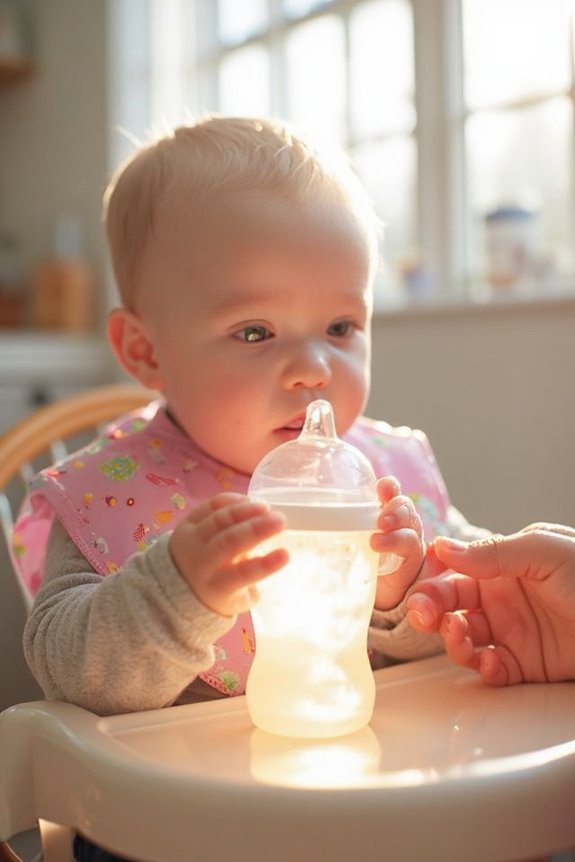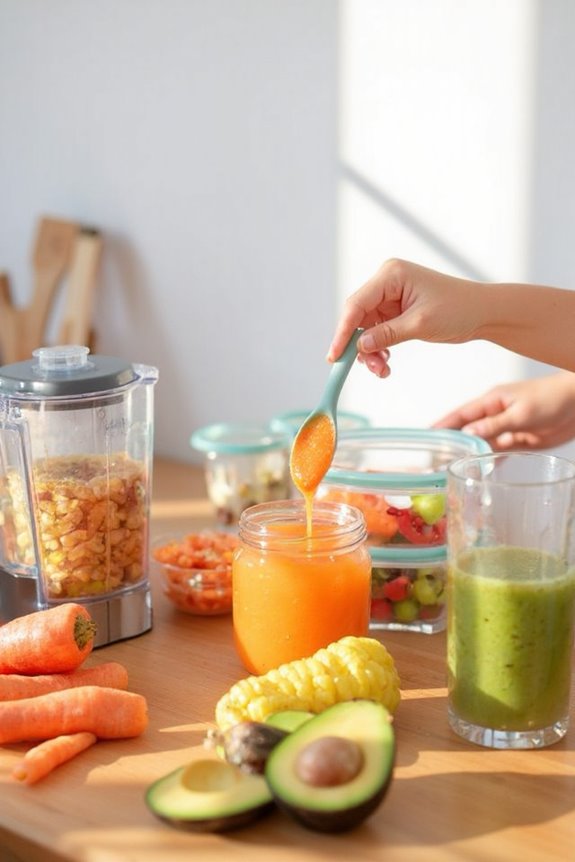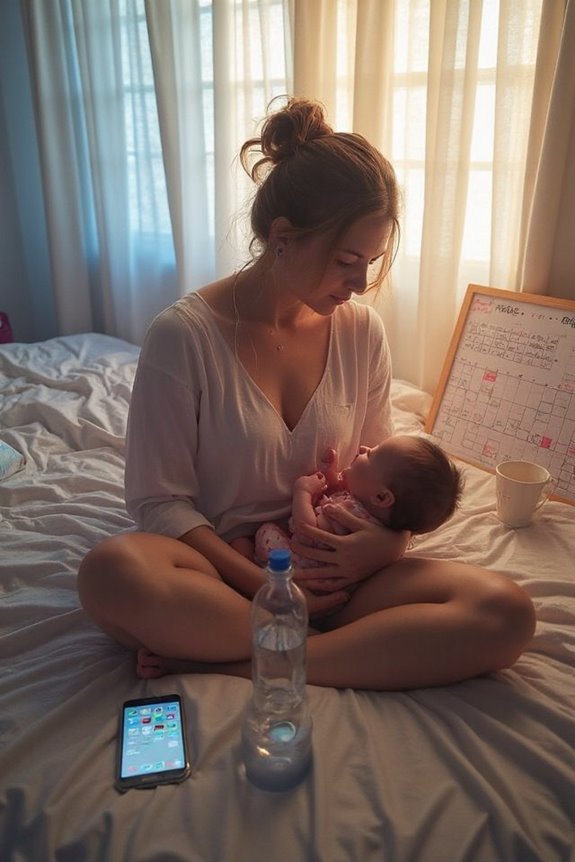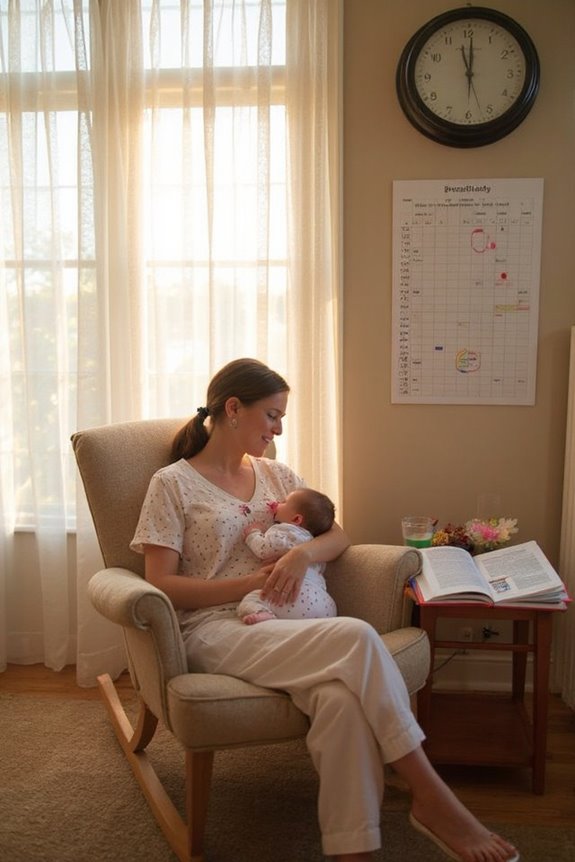Babies should not drink water before 6 months of age. During this critical period, infants receive all necessary hydration exclusively from breast milk or formula. Introducing water too early can cause dangerous water intoxication, disrupt electrolyte balance, and reduce essential nutrient intake. Around 6 months, when starting solid foods, you can offer small amounts (4-8 oz daily) in an open cup or straw cup. Below, I’ll explain how to safely shift your baby to water consumption.
Key Takeaways
- Babies should start drinking water at around 6 months of age when solid foods are introduced.
- Before 6 months, breast milk or formula provides all necessary hydration for infants.
- Early water consumption can cause water intoxication and disrupt electrolyte balance in young infants.
- Start with small amounts (4-8 oz) offered in an open cup or straw cup during mealtimes.
- Water should supplement, not replace, breast milk or formula feedings during the transition to solid foods.
The Critical Role of Breast Milk and Formula in Infant Hydration
When it comes to keeping your baby properly hydrated, breast milk and formula are nature’s ideal solutions. Both provide complete nutrition and adequate hydration for babies during their first six months of life.
The breast milk benefits extend beyond basic nutrition:
- Contains optimal water content to maintain infant hydration
- Adapts to environmental conditions (increasing water content in hot weather)
- Supplies nutrients essential for brain development and immune function
Formula composition is carefully regulated to:
- Mimic breast milk’s nutritional profile
- Provide proper hydration without supplemental water
- Support healthy growth and development
I recommend ensuring you’re well-hydrated if you’re breastfeeding, as your fluid intake affects milk production. Remember, babies don’t need additional water until they begin solid foods around six months.
Safe Timeline for Introducing Water to Your Baby
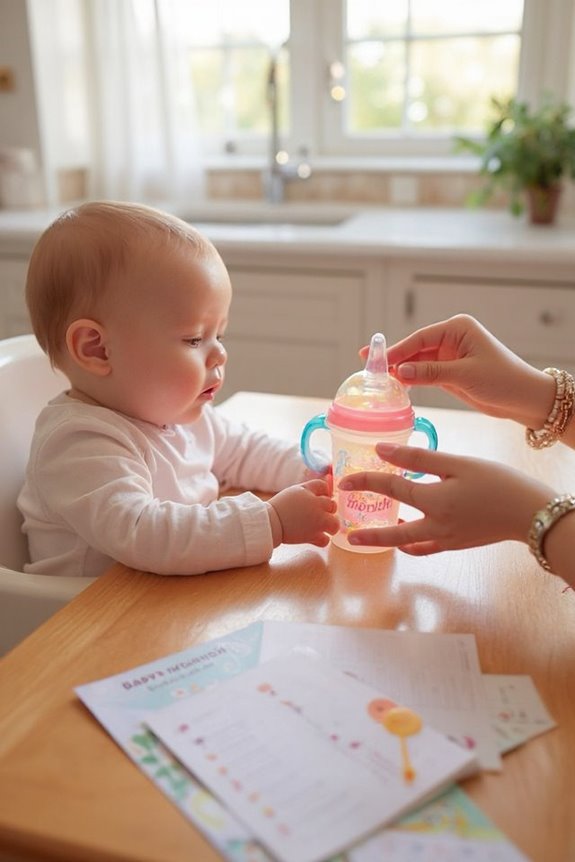
Now that you understand how breast milk and formula hydrate your baby, let’s look at when you can safely add water to their diet. The appropriate timeline for water introduction is around 6 months of age, coinciding with the start of solid foods.
Before this milestone:
- Babies under 6 months should receive hydration exclusively from breast milk or formula
- Early water consumption can disrupt electrolyte balance and reduce essential nutrient intake
When introducing water at 6 months:
- Offer small amounts (4-8 oz) in an open cup or straw cup
- Never use bottles for water
- Make certain water doesn’t replace milk feedings
As your baby develops, gradually increase water while maintaining adequate milk intake. This careful approach to baby hydration establishes healthy habits while protecting their nutritional needs during this critical growth period.
Understanding the Dangers of Early Water Consumption
 Introducing water too early in your baby’s life can lead to serious health consequences that many parents don’t realize. The primary risk is water intoxication, a dangerous condition that occurs when excess water dilutes sodium levels in your baby’s bloodstream.
Introducing water too early in your baby’s life can lead to serious health consequences that many parents don’t realize. The primary risk is water intoxication, a dangerous condition that occurs when excess water dilutes sodium levels in your baby’s bloodstream.Infants under six months have immature kidneys that can’t properly process large amounts of water. This can result in:
- Hyponatremia (dangerously low sodium levels)
- Seizures
- Brain swelling
- In severe cases, coma or death
Your baby’s developing brain and kidney systems are particularly vulnerable during this early stage. When babies fill up on water instead of nutrient-rich breast milk or formula, they also miss essential calories and nutrients needed for proper growth and development.
I recommend following your pediatrician’s guidance on the appropriate time to introduce water.
Proper Methods for Offering Water to Infants
Once your baby reaches the six-month milestone, you’ll need to know how to safely introduce water into their diet. The right offering techniques can make this shift smoother.
When selecting cups, I recommend using an open cup or straw cup rather than bottles. This helps develop important drinking skills while preventing overconsumption. Start with small amounts—just a few sips during mealtimes—to help your baby acclimate to water’s taste.
Remember these key points:
- Never use bottles for water
- Introduce water gradually at mealtimes
- Monitor consumption carefully
- Demonstrate drinking water yourself
Cup selection matters greatly. Choose cups specifically designed for babies that are easy to hold and sip from. Your pediatrician can recommend appropriate options based on your baby’s development.
Monitoring Your Baby’s Hydration Levels
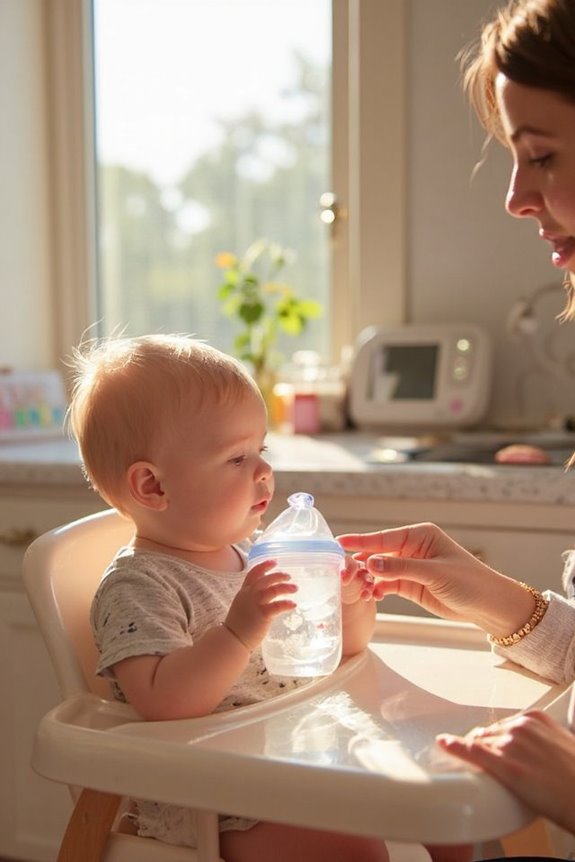
Proper hydration is critical for your baby’s health, especially as you introduce water into their diet. I recommend monitoring these key hydration signs daily:
- Urine checks: Look for light-colored urine and 6-8 wet diapers daily
- Physical indicators: Moist lips and tongue, tears when crying, and normal skin elasticity
- Behavior: Alert and responsive (not unusually fussy or lethargic)
Effective monitoring techniques include:
- Tracking diaper changes in a simple log
- Checking the fontanelle (soft spot) isn’t sunken
- Testing skin elasticity by gently pinching (it should spring back quickly)
Contact your pediatrician immediately if you notice fewer than 4 wet diapers daily, sunken eyes, dry mouth, or unusual lethargy—these may indicate dehydration requiring prompt medical attention.
Frequently Asked Questions
Can Babies Drink Flavored or Infused Water?
I don’t recommend flavored water or infused water for babies. They contain unnecessary sugars, potential allergens, and additives that aren’t suitable for infants. Stick with plain sterilized water after six months of age.
Is Bottled Water Safe for Infants?
You might wonder about the safety lurking in those plastic bottles. I’d advise caution – not all bottled water types are equal. Choose purified or distilled varieties with proper water purification methods for your infant.
Should Babies Drink Water Before Bedtime?
I recommend against giving water before bedtime to babies under 6 months. For older infants, bedtime hydration should come primarily from breast milk or formula to address any nighttime thirst safely.
Can Water Help With Infant Constipation?
I don’t recommend water as a direct constipation remedy for infants. It’s about hydration benefits, not treatment. Breast milk or formula provides necessary hydration. For true constipation remedies, prune juice or medical consultation works better.
How Does Altitude Affect a Baby’s Water Needs?
At higher altitudes, I find your baby’s hydration needs increase considerably. Altitude effects include faster water loss through breathing and sweating, so I’d recommend offering more frequent feedings to prevent dehydration.
References
https://www.pregnancybirthbaby.org.au/when-can-babies-drink-water
https://huckleberrycare.com/blog/when-can-babies-drink-water
https://solidstarts.com/water/
https://www.webmd.com/parenting/baby/what-you-need-to-know-water-infants
https://www.medicalnewstoday.com/articles/when-can-babies-have-water
https://www.danoneresearch.com/vital-role-hydration-breastfeeding/
https://my.clevelandclinic.org/health/articles/15274-benefits-of-breastfeeding
https://www.ncbi.nlm.nih.gov/books/NBK148970/
https://wmmc.com/ten-facts-about-breastfeeding/
https://www.stlouischildrens.org/health-resources/pulse/water-intoxication-infants

